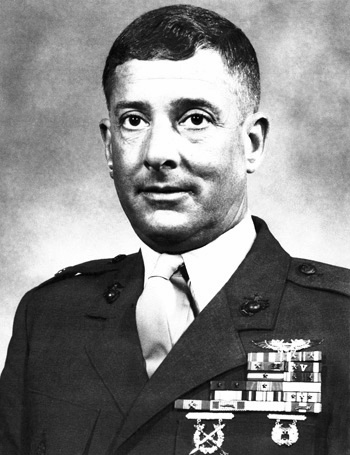
|
William D. Carr |
 |
|||
| Rank, Service | ||||
Colonel O-6, U.S. Marine Corps |
||||
| Veteran of: | ||||
|
||||
| Tribute: | ||||
Charlie Carr was born on May 15, 1933, in New York City. He enlisted in the U.S. Marine Corps on February 1, 1953, and then completed Aerial Navigator School. His first assignment was with transport squadrons in Japan and South Korea from July 1954 to October 1955. He then received an honorable discharge, returning to active duty in 1956, and then serving with transport squadrons in Japan and MCAS Cherry Point, North Carolina, from 1956 to 1960. From 1960 to 1962, he served with VX-6 at NAS Quanset Point, Rhode Island, and during this time spent two summer seasons in Antarctica. Sgt Carr next completed Warrant Officer School at TBS Quantico, Virginia, being appointed a Warrant Officer CWO1 on May 1, 1962, followed by service with a VMAQ squadron at MCAS El Toro, California, and MCAS Iwakuni, Japan, from 1962 to 1964. After completing A-6 Intruder Bombardier/Navigator training, he was assigned to VMA (AW)-533 at MCAS Cherry Point from 1965 to 1967. He then deployed to Southeast Asia, serving as an A-6 Bombardier/Navigator flying out of Chu Lai, South Vietnam, from 1967 to 1968, followed by service with VMA (AW)-332 at MCAS Cherry Point from 1968 to 1969, when he returned to Southeast Asia for a second tour. During his first tour in Vietnam, CWO2 Carr was offered the choice of being promoted to CWO3 or to take a commission as a 2d Lt, and accepted the commission in 1967. Lt Carr served with VMA (AW)-242 at DaNang, South Vietnam, from 1969 to 1970, followed by Amphibious Warfare School at Quantico from 1970 to 1971. His third tour in Southeast Asia was as an A-6 Bombardier/Navigator with VMA (AW)-224 aboard the aircraft carrier USS Coral Sea (CV-43) from November 1971 to July 1972. During this time, he flew as Bombardier/Navigator with the Commander of Carrier Air Wing 15 who led the mining of Haiphong Harbor in North Vietnam in May 1972, which helped end the war. After attending Command and General Staff College at Quantico, he served with Headquarters U.S. Marine Corps at the Pentagon in Aviation Planning and Programs from 1973 to 1977, followed by service on the staff of Marine Air Group 14 at MCAS Cherry Point from 1978 to 1979. Col Carr served as Commanding Officer of VMA (AW)-533 at MCAS Cherry Point from 1979 to 1982, and then served in the Aviation Department with Headquarters U.S. Marine Corps in the Pentagon from 1983 to 1985. Col Carr was Commanding Officer of Marine Air Group 14 at MCAS Cherry Point from 1985 to 1987, and then served another tour with Headquarters U.S. Marine Corps in the Pentagon from 1988 to 1990. During Operation Desert Shield in late 1990 and early 1991, and Operation Desert Storm, Col Carr served as Chief of Staff of the 3rd Marine Aircraft Wing, where he flew combat missions in the F/A-18 Hornet, A-6 Intruder, and the EA-6B Prowler. His next assignment was as Secretary of the General Staff at Headquarters U.S. Marine Corps from 1991 to 1992, followed by service as G1 at MCAS Cherry Point from 1992 until his retirement from the Marine Corps on August 1, 1994. Col Carr has over 10,000 flying hours in various attack, fighter, and support aircraft, and he flew 670 combat missions in two wars. He also has 376 arrested landings on various aircraft carriers of the fleet. Charlie Carr died on November 24, 2018. |
||||
|
||||

